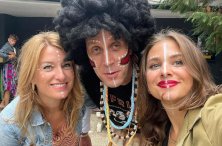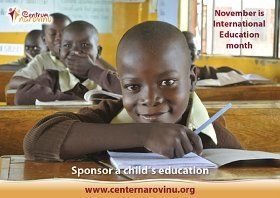Dear headmistress/headmaster, teachers and students,
we are asking you to participate in the project “Adoption of African children – a long-distance help project”, which our non-profit society Centrum Narovinu has been organising since 2002. This year, we are celebrating 20 years of the project – 20 years of beautiful stories. Help us fulfil the dreams of Hope Island students and give them a better future by becoming their patron and by supporting them on their educational journey.
There are currently over 500 children from kindergarten to high school in the Island of Hope complex. You can choose the best partner for communication with your students.
The project is of course beneficial for both parties. Yet, what exactly will it bring to you?
The opportunity to be directly involved in a meaningful development project and monitor its impact - you will be in regular written contact with students and their families. You will receive a report card, letters and photos 3 times a year. By actively communicating and sharing experiences, you can inspire each other and co-create and advance the project with your own experiences and ideas.
Digging deeper into the topics of multicultural education, development cooperation and effective assistance – students will develop critical thinking and, thanks to personal and direct involvement in the project, their sensitivity as well as the sensitivity to effective assistance, solidarity and empathy with people of other cultures and their problems will increase. The project also contributes to the creation of a tolerant multicultural society and to the prevention of discrimination and racism. You can connect the `Distance Adoption Project` with your subjects and teaching projects – regular communication in English, linking topics in history, geography, multicultural studies, music or art education, etc. Within the Island of Hope, there is also the possibility of online connection and communication with children and classes “live”.
It's a good feeling that you are helping where it is most needed – the children in our project come from the fishing community of Rusinga Island and very difficult life situations. Poverty often leads to illiteracy and low education, girls do not often even complete basic education… That is why we support children's education and their chance for a better future.
The project is much more than just economic assistance – it creates a bond of solidarity and understanding between different cultures. The amount to support one child in the elementary school is 7,200 CZK (300 EUR) per year, and in secondary school and in the orphanage Ostrov Naděje it is 16,800 CZK (660 EUR). It is also possible to spread the payment into several instalments. The money pays for everything the child needs to study (school uniform, textbooks and school supplies, school fees, etc.), and in the case of high school and orphanages, the amount also includes accommodation and food costs.
You can find more detailed information about the project, including references from schools that already cooperate with the project, on our website www.AdopceAfrika.cz, and you can also follow the latest information on www.facebook.com/CentrumNarovinu
If you are interested in more information, we will be happy to organize an introductory informational lecture at your school with screenings and talks, thus bringing teachers and students closer to life in Kenya, everyday problems and support options.
We wish you a successful start to the new school year and look forward to cooperation with other schools.
For the Centrum Narovinu, Simona Heřtusová simona.hertusova@adopceafrika.cz
We attach some references from schools and students who are already involved in our project. More stories of adoptive parents and children can be found on our website.
Our school has been supporting the project of long-distance adoption since 2007, when we adopted little Muthina from Kenya. Muthina is now an adult, as are some of our former pupils… We raise funds for the adoption by selling our pupils' products. I think we have not only changed the life of one “child” from rural Kenya. But also we who have been involved in making and selling, and all those who have bought something from us over the years, have at least for a moment thought about how the world works. And about things that we take for granted but are not taken for granted everywhere. Bohuslava Dusíková, Kladruby Primary School
Distance adoption seems important to me because I believe that every child has the right and entitlement to an education. Nela, student at Kladruby Primary School
What I liked about selling at the markets is that we can really help someone. Zuzka, student at Kladruby Primary School
We have been cooperating with the Narovinu Centre for several years. We have adopted a girl Sasha, we support the Fair Trade Shop and the purchase of gifts with a story between teachers and parents, and we have organized several fundraisers – we have collected a car full of books, art and educational materials for the children of the Island of Hope. We were sent photos and videos of happy school children as proof of how they use the books, writing and art supplies from us. I know that it is possible to help also in our country, but what led me to organize the adoption in Kenya was multicultural education and the idea that children could learn about another culture, poverty in these areas and the compassion and solidarity that goes with it. Last but not least, the deepening of English and the possibility of correspondence with the adopted girl was the reason for the collaboration. Silvie Letáčková, Stolany Primary School
In the first half of the year, our school lived with the project “Jambo Africa”. In the preparatory phase, the children learned the song Jambo Kenya, made teaching aids and poster designs for the African meeting of pupils, teachers and parents. African workshops were conducted in each classroom under the guidance of the Narovin Centre, with African themes included in all subjects. And the highlight of the week was the online linking of each second grade classroom with African children on Rusinga Island. The online linking was also included in the programme for the final African session. At the meeting, our children sang a song to their African friends and talked with them about a variety of topics. There was no end to the questions. We are all most happy about the adoption of an African girl, Evaline, who we were able to adopt thanks to the voluntary contributions of the parents of our kids. What to say in conclusion? The project was beautiful, the cooperation with the Narovinu Centre was perfect and the feedback from pupils, teachers and parents was very positive. Thank you very much, it makes a lot of sense! Gabriela Šmerdová, Victoria School
In 2009, the cooperation with the Narovinu Centre began and has continued without interruption until now. Adoption of Kenyan children takes various forms in our case. Sometimes a child is adopted by the class as a whole, other times just a few students from several classes join forces together either with the coordination of the Student Parliament or just through the support of the class teachers. This school year we have supported four adopted children, Ronny (10th year of adoption, Secondary School), Brian (9th year, University), David (5th year, Secondary School) and Edwin (Secondary School). Thanks to online networking, we have been able to do projects that we hadn't originally considered. Our very communicative, academically gifted and organisational Brian works online so that the adoptive class can meet with him via Teams during the school year. Lenka Kopečková, Gymnázium Třeboň
My school is very special, everyone can give their opinion and share their problems. We even talk about things that bother us at school and how we would like to solve them. In most public schools, students are not allowed to talk about what bothers them in class. Elsewhere, it is common for teachers to set rules that must be followed, and if they are not, corporal punishment is no exception. I have changed a lot since I have been attending the Humanist High School and have learned many things. I have found that problems can be solved peacefully and without any violence. I have also realized that it is very important to have an opinion, and if I believe in something, I stand by it, even though others may see it differently. Jackquen Faith, student at Hope Island High School
The education I received in an environment where creativity, innovation, healthy self-esteem, non-violence and critical thinking are emphasized, made me a person capable of cooperation and compassion, a person with a sense of solidarity who is able to continue working on his own development and the development of society. The teachers and other staff set a good example. The rules were created through discussions between teachers and students. Teaching was not only about studying alone, but also about developing the students' individual talents. David Odhiambo, a student at Island of Hope Primary and Secondary School




































